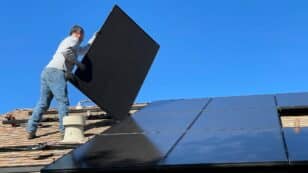
Nebraska Solar Incentives (Rebates, Tax Credits & More in 2024)
In this Nebraska solar incentives guide, we’ll answer:
- What solar incentives are available to Nebraskans in 2024?
- How much can solar incentives and rebates save when I go solar in Nebraska?
- How do I apply for each solar incentive in Nebraska?
Each product and or company featured here has been independently selected by the writer. You can learn more about our review methodology here. If you make a purchase using the links included, we may earn commission.
Do Nebraska Solar Incentives Make It Affordable for Homeowners to Go Solar?
Although Nebraska has a reputation for huge productivity in agriculture, it’s definitely not known for its solar power production. The state generates a mere 0.2% of its power from solar, and one of the main reasons is likely the lack of solar incentives, especially for residential customers.1
On top of that, the cost of solar panels in Nebraska comes in at an average $3.55 per watt — higher than in many other states.
Unfortunately, Nebraska has no Renewable Portfolio Standard (RPS) that would pave the way for more solar incentives and faster adoption of solar technology. In 2020, state legislators moved to introduce a renewable energy standard in NE, but none was adopted.2
Despite the lack of momentum towards solar generation, Nebraska has tremendous solar potential, as it receives an average of 223 days of sun per year compared with the U.S. average of 2053. Residential systems could generate massive amounts of power in The Cornhusker State. And although NE might not have a ton of solar incentives, residents can benefit from the federal and other incentives that are available to them.

GRNE Solar

Regional Service
Average cost
Pros
- Representatives are experts on local policies
- Comprehensive service offerings
- Excellent reputation
Cons
- Limited brands of solar equipment available

GenPro Energy Solutions

Regional Service
Average cost
Pros
- NABCEP-certified technicians
- Competitive pricing
- Multitude of products and services
Cons
- No leases or PPAs
- Limited warranty coverage
Here are the top solar incentives available to Nebraskans:
| Solar Incentives in Nebraska | Incentive Type | Description | Occurrence | Estimated Dollar Amount You Can Receive |
| Federal Solar Investment Tax Credit (ITC) | Federal | Credits 30% of your entire system price to your income tax burden for the tax year your system is commissioned | One-time: Gets applied when you file your taxes for the year your system is installed | $11,183 via tax credits on average in Nebraska |
| Nebraska Dollar and Energy Savings Loans | State | Low-interest loans for purchasing solar at a simple interest rate of 5%, 3.5% or less | One-time: Applies when you qualify for the program before you install your system
|
Varies based on system size, cost, and the applied interest rate |
| PACE Financing | Local | Affordable and accessible solar loan options that add your payments to your property tax bill | One-time: Applies when you qualify for the program before you install your system | Varies based on your system cost, interest rate, repayment period and more |
| Net metering | Local | Lets you earn credits with excess solar energy that can pay down future utility bills | Ongoing: Always in effect | Varies based on your system size, your monthly energy bills, your energy consumption and more |
| Lincoln Electric System Capacity Payment | Local | One-time payment for net-metered systems (below 25 kW) installed by the utility’s customers | One-time: Applies when you install a system and connect it to LES’s grid | $375/kW for southern-facing systems, $475/kW for western-facing/ tracking systems |
What Do Nebraskans Need to Know About the Federal Solar Tax Credit?
The federal solar investment tax credit (ITC) is the most valuable financial incentive available for PV systems in Nebraska. It’s offered by the federal government and is available to all Nebraska homeowners.
The federal credit is for 30% of your entire system cost. In Nebraska, where residents pay around $37,275 for a system of the average size in the area (10.5 kilowatts), the credit amount comes out to around $11,183.
This amount gets applied to the income taxes you owe for the year your system is installed. If you can’t take the full credit that year, you can roll over any remaining credit for up to four additional years.
The federal credit was originally offered in 2005 and set to expire in 2024, but thankfully it was extended in 2022 and boosted back up to 30%. It’s now available according to the following rate schedule:
- If you install a solar power system before the end of 2032, you can claim 30% of the total cost of installation as a federal tax credit
- The benefit will remain available in 2033, but it will be reduced to 26%
- The credit will decrease again to 22% in 2034
- The tax credit will be phased out in 2035 unless it is renewed by Congress
How to Claim the Federal ITC in Nebraska
The federal credit provides a massive benefit for most solar customers and is made even better by the fact that filing for it takes just a few minutes and minimal effort. You can follow the simple steps below to take advantage of this perk.
- Step 1: When it’s time to file your taxes for the year your system was installed, go to the IRS’s website and print out form 5695.
- Step 2: Fill out the form. You’ll need the contact information for the Nebraska solar panel installation company you hired to install your panels, and you’ll also need some basic information about what equipment was installed on your home. You may need to reach out to your solar company for the system size and value.
- Step 3: File the IRS form when you file your taxes or have your accountant file it for you.
If you use tax software like H&R Block or TurboTax, the program should automatically prompt you for information about solar conversion. Just report that you did install solar, and the software will ask you for all of the pertinent information instead of having you go to the IRS’s website.
EcoWatch’s Opinion on the Federal ITC in Nebraska
The federal credit is the single most lucrative incentive available in Nebraska, and it’s the one we recommend taking advantage of over all others. It takes just a few minutes to file for, and it provides an average value of $11,183, so it’s well worth your time.
Just keep in mind that the federal credit is not a rebate, so you’re not guaranteed to get the entire amount back. Instead, the credit amount gets applied to any income tax you owe, which means if you don’t owe money on your taxes, you won’t be able to take the credit.
If you can only take a portion of the credit in the first year, your tax liability should drop to $0, and the remaining credit will roll over for up to four additional years. You’ll only be able to take the full credit if you expect to owe an average of at least $2,236 per year in income taxes across the five years.
Nebraska Dollar and Energy Savings Loans

For solar power systems, the maximum loan term can be up to 10 years, with a minimum monthly payment of $50. All types of solar customers, including homeowners, business owners, local governments and farm owners can take advantage of these loans.
The eligible loan amounts are as follows:
- For systems up to 10 kilowatts (kW), $14,000 for the first kW and $4,000 for each additional kW
- For systems larger than 10 kW, $19,000 for the first kW and $4,000 for each additional kW, up to 15 kW
For example, a 10 kW system in Nebraska will be eligible for $14,000 for first kW and $4,000 for each of the additional 9 kW, adding up to $50,000. Considering the fact that the average system in Nebraska costs less than $30,000, the loan limits are well above the required amounts.
How to Claim Nebraska Dollar and Energy Savings Loans
All the process details for obtaining a Nebraska Dollar and Energy Savings (DES) loan are available on the Nebraska Department of Environment and Energy’s DES webpage. For DES loans, you will work directly with lenders. Most financial institutions in Nebraska offer DES loans.
Step 1: Complete Form 20 and Form B, available on the DES webpage.
Step 2: Find a qualifying lender and work with it to complete additional requirements to create a complete loan application. These will include at least one bid to install your system — some lenders require more than one bid.
Step 3: NDEE will review your project and reserve funds for your loan if approved.
Step 4: If your project is approved, your lender will notify you that the installation can begin.
EcoWatch’s Opinion on the Nebraska Dollar and Energy Savings Loans
Solar loans, particularly low-interest ones, are a superb way to ease the up-front burden of investing in solar. Most solar loans offer a low or 0% interest rate, but Nebraska’s DES program offers a relatively low simple interest rate that does not compound.
This makes it a much easier loan to pay off. The loan also has high maximum amount limits, meaning all solar customers should be able to take advantage of the full benefit of this loan.
The DES loan process is somewhat complex but these loans are advantageous to potential solar customers struggling to overcome the barriers to entry to solar.
Watch Below: Learn How Solar Energy Storage Works and Whether It’s RIght For You
Nebraska Property Assessed Clean Energy (PACE) Financing
In 2016, the Nebraska state legislature passed The Property Assessed Clean Energy Act, which authorizes municipalities to implement programs to finance energy efficiency improvements and renewable energy systems on both residential and commercial properties4. The Cornhusker State believes promoting energy efficiency and use of renewable energy will help the economy prosper, decrease living costs, and keep public power costs low — all great motivations for going solar.
PACE programs are targeted at lowering the barriers to entry for solar by reducing loan down payments and keeping interest rates below the market average. Loan repayments are made as part of property tax bills.
The average savings you can enjoy with this program will depend on a number of factors including the cost of your system, your loan terms and more.
How to Claim Nebraska PACE Financing
Not every municipality in Nebraska has implemented a PACE program, and relatively few offer residential PACE opportunities — more offer only commercial PACE loans. The City of Columbus is one Nebraska municipality that does currently offer a residential PACE program5.
Follow these steps to take advantage of PACE financing for a solar system:
Step 1: Contact your municipality to see if they have a residential PACE program.
Step 2: If your municipality does have a program, it will probably have an application available for you to fill out.
Step 3: Complete and submit your application.
Step 4: Your municipality will contact you on next steps.
EcoWatch’s Opinion on Nebraska Property Assessed Clean Energy (PACE) Financing
PACE financing can act as a great catalyst for homeowners to convert to solar, especially considering the small number of residential solar incentives in the state. However, there are some pretty significant downsides to the PACE program that make it a non-ideal option for many homeowners.
PACE loans add the system total to your tax bill, so if you sell your home before the loan is paid off, the remaining balance transfers to the new owner. This might be good news for you, but it means your home will likely be less desirable to the new owner, and it may even make your property harder to sell.
The PACE program for residential solar also has very limited availability in Nebraska. Only a few municipalities have adopted it — it’s much more widely available for commercial and multi-family residential properties.
Net Metering in Nebraska

Those credits can be applied to future electric bills, so you can reduce your bills even when your solar production is lower than your energy consumption.
While net metering is generally a great way to add flexibility to your solar power production and consumption while saving on bills, Nebraska’s net metering policy is not ideal. In NE, the excess energy that a customer supplies to the grid is often credited at the avoided-cost rate, which is lower than the retail rate. The rate at which energy sent to the grid is compensated is set by individual utilities in NE.
Aside from regular net metering, Lincoln Electric System offers virtual net metering to its customers. This program allows customers to buy “virtual” solar panels — an investment representing a portion of the LES community solar facility’s output. You’ll get credits on your electric bills related to the number of virtual panels you invested in and the actual energy production of the solar facility.
How to Enroll in Net Metering in Nebraska
Enrolling in net energy metering often requires no work on the homeowner’s part in Nebraska. Your solar installer may do the work for you by arranging for interconnection with your local utility company — you should ask if they will take care of this for you as part of evaluating contractors and bids.
In case you need them, these are the steps to enrolling in net metering:
- Step 1: Contact your electric utility to ask if you have a bidirectional meter installed that will allow you to participate in net metering. If you don’t, your electric company should install one for free.
- Step 2: Before beginning your solar system installation, you or your contractor will need to submit your utility’s application for interconnection and wait for approval. You may also need to sign an intergeneration contract with your utility.
- Step 3: Once you’ve gotten approval from your utility and any contract has been signed, you can proceed with installation.
- Step 4: Although not necessary, it’s a good idea to monitor your electric bills for a few months after your system is installed to confirm that you’re getting credited for your solar production. If you’re not, you may need to call your installer to report the issue.
You can enroll in LES virtual net metering here.
EcoWatch’s Opinion on Net Metering in Nebraska
It’s great that Nebraska mandates net metering, but most utilities compensate users at the avoided-cost rate rather than the more beneficial retail rate. We wish the state would mandate compensation at the retail rate, but net metering is still a great benefit for all Nebraska solar panel owners to have.
Local Solar Incentives in Nebraska
Nebraska does not have a ton of local solar incentives available. However, customers of Lincoln Electric System can benefit from a perk related to net metering.
Customers whose solar panel systems are installed by a participant in LES’s Solar Trade Ally Network may qualify for a one-time capacity payment determined by the system size and the direction the system is facing. For example, customers with south-facing fixed systems may qualify for a payment equal to $375 times the installed kW. For a system that is western-facing or equipped with tracking, LES offers $475 per kilowatt.
For the typical 10.5 kW system in Nebraska, customers could get $3,937 for a qualifying south-facing system or $4,987 for the western-facing or system or system with tracking.
Which Incentives Are The Best In Nebraska?
Above, we’ve discussed all of the incentives and solar perks available to Nebraska property owners, but not all of these programs are equally valuable. The following two are the most valuable perks available, and we recommend taking these over the other options if you’re tight on time to apply.
- Federal Tax Credit
- Lincoln Electric System Rebate
Nebraska has a relatively small arsenal of solar incentives. Among these, we think the federal tax credit is the best and most important incentive to choose. The ITC provides the most up-front savings among all the available incentives in the state. The LES capacity payment is also a great incentive, saving a few thousand dollars on a new system, but it is available only to company customers whose systems meet certain requirements.
What Do Nebraskans Need To Know About SRECs / TRECs?
Solar Renewable Energy Certificates (SRECs), are credits that solar customers can sometimes earn for their solar production. In states with an active SREC market, customers usually earn one credit for every 1,000 kWh of production (one megawatt-hour). Those credits can then be sold for a profit to help pay off your panels.
Unfortunately, Nebraska currently does not have an active SREC market, so these energy credits are not available in the area.
What’s The Near Term Outlook For More Incentives In Nebraska?
At this time, there are no initiatives to bring additional solar incentives to Nebraska. The Cornhusker State doesn’t have an RPS, which usually serves as an impetus for multiple incentives. If Nebraska does implement an RPS in the future, the likelihood is that more solar incentives will follow.
The cost information presented in this article is derived from a comprehensive analysis, incorporating data from multiple industry sources. The average cost per watt per state was calculated based on figures from Consumer Affairs, Energy Sage, and Berkeley Lab’s Electricity Markets & Policy Department. Additionally, monthly energy consumption and the average monthly cost of electricity were sourced from the U.S. Energy Information Administration, ensuring a well-rounded and accurate representation of the information presented.
FAQ: Solar Incentives Nebraska
The EcoWatch team is thrilled to get questions from Nebraska homeowners about solar incentives because it shows an interest in clean energy from one of the least solar-friendly states. Below are some of the questions we see most often. If you have specific questions that aren’t answered here, reach out to our team of solar experts at solar@ecowatch.com.
At this time, there are no plans or pieces of legislation proposed to increase the incentives available in Nebraska anytime soon. If the state does set an RPS, we might see incentives added to help the state reach its standard. However, there’s currently no evidence that an RPS is in the works.
The Inflation Reduction Act of 2022 made two crucial changes for solar energy and renewable energy in general.
First, it extended the federal credit by ten years, and it increased the credit rate back up to the previous rate of 30%. This is an important change that could save Nebraska property owners an average of $11,183.
Second, it added perks for electric vehicle purchases. The maximum tax incentive was bumped up to $7,500 per EV. It’s important to remember that solar panels on your home can also serve as a gas station for EVs, adding thousands of dollars to the potential savings they can provide.
There are currently no plans for solar programs to decrease or become less beneficial in the current year in Nebraska.
However, as mentioned above, Nebraska currently doesn’t have an RPS. If the state does set one, chances are high that solar incentives would increase.
Comparing authorized solar partners
-
- Representatives are experts on local policies
- Comprehensive service offerings
- Excellent reputation
- Limited brands of solar equipment available
A+Outstanding Regional Installer
Having trouble deciding? Click below and use our process to receive multiple quotes instead:

 233k
233k  41k
41k  Subscribe
Subscribe 


